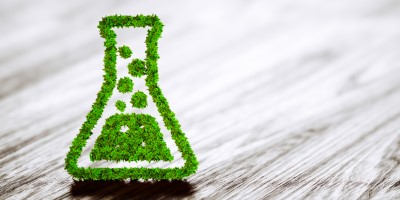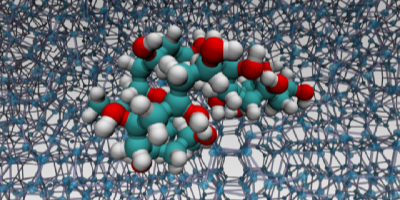News Library
Funding granted for cleaner, greener chemicals

Researchers at the Universities of Warwick and Nottingham have received EPSRC funding to launch a ground-breaking research programme for global specialist chemical manufacturer, Lubrizol.
Solving the puzzle of polymer-ice binding for cryopreservation

When biological material is frozen, cryoprotectants are used to prevent ice damage. How do newly emerging polymeric cryoprotectants control ice formation and growth during freezing?
Prof. Matthew Gibson awarded 2021 McBain Medal from the RSC and SOCI
Professor Matthew Gibson has been awarded the 2021 McBain medal from the Society for Chemical Industry and Royal Society of Chemistry. This award is to "honour an early career researcher or technologist who has made a meritorious contribution to colloid and interface science." There were will be a special symposia late in 2021 where Matt will receive the medal and give a lecture.
GibsonGroup's Glycosylated nanoparticles for selective galectin targeting is ‘HOT’ article in Chemical Science
Glycans (aka sugars, carbohydrates) direct many recognition and signalling processes in biology. Multivalency (presentation of lots of copies) is crucial to overcome glycans intrinsic low affinity, hence materials (polymers, particles, surfaces) which display them are appealing probes of function, or as new diagnostics (e.g. see our work on COVID diagnostics). However, most studies use simple monosaccharides, which may not have selectivity or are only tested against plant proteins. In this work, we collaborated with teams from Bristol, York and Southampton - our collaborators developed a chemoenzymatic synthesis to obtainselectively fluorinated glycans based on lacto-N-biose. Fluorine is appealing as it is small, does no have significant effects on conformation, but can change hydrogen bonding patterns. These glycans were incorporated into our polymer-stabilised nanoparticle platform, and found to modulate the affinity towards 2 galectins -an important class of galactose-binding biomarkers. This work shows that unnatural glycan-functional nanoparticles could be deployed as biosensors.
BonLab takes the International Polymer Colloids Group online in exciting global weekly science webinar series
The International Polymer Colloid Group (IPCG) was founded in 1972 as a global forum for the exchange of ideas and emerging research activities for scientists and engineers from both academia and industry who study or use polymer colloids.
It is a vibrant scientific international community who normally meet face-to-face every two years to discuss the latest global developments related to polymer colloid science (2013 Shanghai, 2015 New Hampshire, 2017 the Basque Country, 2019 Singapore).
As a result of the global COVID19 pandemic, prof. dr. ir. Stefan Bon came up with the idea to take the IPCG forum online with a series of weekly scientific webinars, called the i-PCG 2020 Webinars. Anyone who is interested in science can participate as audience member, or even better, as presenter. Expect to interact with the world top in polymer colloid, with expert participants from industry, academia and enthusiasts. All is free.
Freezing cells made safer thanks to new polymer
Freezing cells made safer thanks to new polymer made at University of Warwick
- A new polymer that’s a cryoprotectant dramatically improves the freezing of cells has been discovered by researchers at the University of Warwick
- The new polymers can reduce the amount of organic solvent required in cryopreservation (freezing cells) as well as giving more and healthier cells after thawing
- Findings may help reduce cost and improve distribution of cells for cell-based therapies, diagnostics and research
Cell freezing (cryopreservation) – which is essential in cell transfusions as well as basic biomedical research – can be dramatically improved using a new polymeric cryoprotectant, discovered at the University of Warwick, which reduces the amount of ‘anti-freeze’ needed to protect cells.
The ability to freeze and store cells for cell-based therapies and research has taken a step forward in the paper ‘A synthetically scalable poly(ampholyte) which dramatically Enhances Cellular Cryopreservation.’ published by the University of Warwick’s Department of Chemistry and Medical School in the journal Biomacromolecules. The new polymer material protects the cells during freezing, leading to more cells being recovered and less solvent-based antifreeze being required.
Cryopreservation of cells is an essential process, enabling banking and distribution of cells, which would otherwise degrade. The current methods rely on adding traditional ‘antifreezes’ to the cells to protect them from the cold stress, but not all the cells are recovered and it is desirable to lower the amount of solvent added.
The new Warwick material was shown to allow cryopreservation using less solvent. In particular, the material was very potent at protecting cell monolayers – cells which are attached to a surface, which is the format of how they are grown and used in most biomedical research.
Having more, and better quality cells, is crucial not just for their use in medicine, but to improve the quality and accessibility of cells for the discovery of new drugs for example.
Cell-based therapies are emerging as the “fourth pillar” of chemo-therapy. New methods to help distribute and bank these cells will help make them more accessible and speed up their roll-out, and this new material may aid this process.
Professor Matthew Gibson who holds a joint appointment between the Department of Chemistry and Warwick Medical School comments:
“Cryopreservation is fundamental to so much modern bioscience and medicine, but we urgently need better methods to meet the needs of advanced cell-based therapies. Our new material is easy to scale up, which is essential if this is to be widely used, and we found it to be very protective for several cell lines. The simplicity of our approach will hopefully help us translate this to real applications quickly, and make an impact in healthcare and basic research.”
ENDS
29 JULY 2019
NOTES TO EDITORS
High-res image available at:
https://warwick.ac.uk/services/communications/medialibrary/images/july2019/mg_cells.jpg
Credit: University of Warwick. Caption: The cells frozen with the polymer (left) and without the polymer (right)
Paper available to view at: https://pubs.acs.org/doi/10.1021/acs.biomac.9b00681
FOR FURTHER INFORMATION PLEASE CONTACT:
Alice Scott
Media Relations Manager – Science
University of Warwick
Tel: +44 (0) 2476 574 255 or +44 (0) 7920 531 221
E-mail: alice.j.scott@warwick.ac.uk
TV stars back Warwick scientists' incredible cancer breakthrough
Two virtual reality videos have been released for this month's Stand Up To Cancer event which showcase research from the University of Warwick and are narrated by actress Olivia Colman and Stephen Fry.
Scientists at Warwick University have discovered an incredible new way of administering chemotherapy drugs which is more effective and safer for the patient.
Stand Up To Cancer is a joint fundraising campaign from Cancer Research UK and Channel 4, which aims to accelerate ground-breaking research, like that being done in Coventry, in order to save lives.
